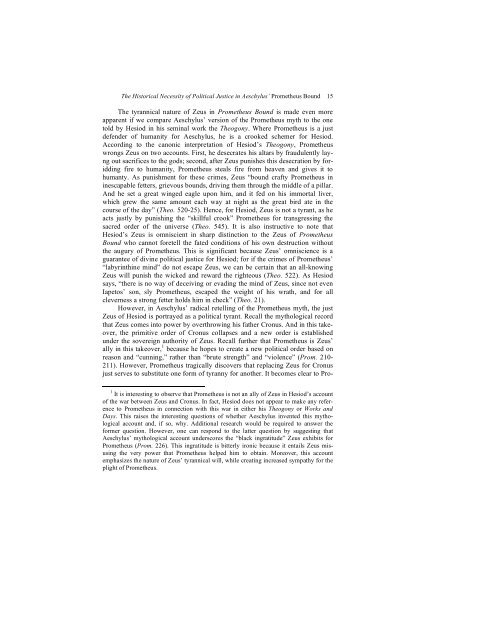Create successful ePaper yourself
Turn your PDF publications into a flip-book with our unique Google optimized e-Paper software.
The Historical Necessity of Political Justice in Aeschylus’ Prometheus Bound 15<br />
The tyrannical nature of Zeus in Prometheus Bound is made even more<br />
apparent if we compare Aeschylus’ version of the Prometheus myth to the one<br />
told by Hesiod in his seminal work the Theogony. Where Prometheus is a just<br />
defender of humanity for Aeschylus, he is a crooked schemer for Hesiod.<br />
According to the canonic interpretation of Hesiod’s Theogony, Prometheus<br />
wrongs Zeus on two accounts. First, he desecrates his altars by fraudulently layng<br />
out sacrifices to the gods; second, after Zeus punishes this desecration by foridding<br />
fire to humanity, Prometheus steals fire from heaven and gives it to<br />
humanty. As punishment for these crimes, Zeus “bound crafty Prometheus in<br />
inescapable fetters, grievous bounds, driving them through the middle of a pillar.<br />
And he set a great winged eagle upon him, and it fed on his immortal liver,<br />
which grew the same amount each way at night as the great bird ate in the<br />
course of the day” (Theo. 520-25). Hence, for Hesiod, Zeus is not a tyrant, as he<br />
acts justly by punishing the “skillful crook” Prometheus for transgressing the<br />
sacred order of the universe (Theo. 545). It is also instructive to note that<br />
Hesiod’s Zeus is omniscient in sharp distinction to the Zeus of Prometheus<br />
Bound who cannot foretell the fated conditions of his own destruction without<br />
the augury of Prometheus. This is significant because Zeus’ omniscience is a<br />
guarantee of divine political justice for Hesiod; for if the crimes of Prometheus’<br />
“labyrinthine mind” do not escape Zeus, we can be certain that an all-knowing<br />
Zeus will punish the wicked and reward the righteous (Theo. 522). As Hesiod<br />
says, “there is no way of deceiving or evading the mind of Zeus, since not even<br />
Iapetos’ son, sly Prometheus, escaped the weight of his wrath, and for all<br />
cleverness a strong fetter holds him in check” (Theo. 21).<br />
However, in Aeschylus’ radical retelling of the Prometheus myth, the just<br />
Zeus of Hesiod is portrayed as a political tyrant. Recall the mythological record<br />
that Zeus comes into power by overthrowing his father Cronus. And in this takeover,<br />
the primitive order of Cronus collapses and a new order is established<br />
under the sovereign authority of Zeus. Recall further that Prometheus is Zeus’<br />
ally in this takeover, 1 because he hopes to create a new political order based on<br />
reason and “cunning,” rather than “brute strength” and “violence” (Prom. 210-<br />
211). However, Prometheus tragically discovers that replacing Zeus for Cronus<br />
just serves to substitute one form of tyranny for another. It becomes clear to Pro-<br />
1 It is interesting to observe that Prometheus is not an ally of Zeus in Hesiod’s account<br />
of the war between Zeus and Cronus. In fact, Hesiod does not appear to make any reference<br />
to Prometheus in connection with this war in either his Theogony or Works and<br />
Days. This raises the interesting questions of whether Aeschylus invented this mythological<br />
account and, if so, why. Additional research would be required to answer the<br />
former question. However, one can respond to the latter question by suggesting that<br />
Aeschylus’ mythological account underscores the “black ingratitude” Zeus exhibits for<br />
Prometheus (Prom. 226). This ingratitude is bitterly ironic because it entails Zeus misusing<br />
the very power that Prometheus helped him to obtain. Moreover, this account<br />
emphasizes the nature of Zeus’ tyrannical will, while creating increased sympathy for the<br />
plight of Prometheus.

















